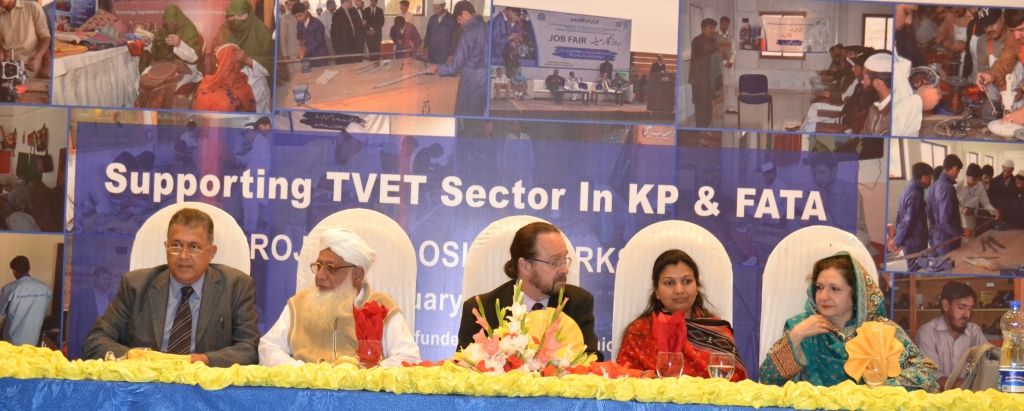
| Project Funding Agency | Project co-funded by the delegation of the European Union to Pakistan |
| Project Implementing Agency |
Technology Upgradation and Skill Development Company (TUSDEC) |
| Project Location | Khyber Pakhtunkhawa (KP) and FATA |
| Project Duration | August 2012 to 28 Feb 2017 |
TUSDEC was awarded the project by the Delegation of European Union to Pakistan in August, 2012 to support TVET sector in Khyber Pakhtunkhwa and FATA which was completed successfully by TUSDEC on 28 February, 2017. It was designed to enhance technical and vocational training in support of economic development and employment opportunities in the targeted areas. The Project’s objective was to improve the involvement of the private sector in technical and vocational trainings in KP and FATA by promoting demand and making the supply of courses more demand oriented. The project majorly focused on the identification of demand driven trades, selection of trainees from target groups, enrollment in selected institutes (service providers), delivery of quality trainings, certification from apex examination bodies, capacity building of institutes, delivery of post training services to the successful candidates and finally placement of trainees in formal/informal sector. The project managed to develop a productive relationship amongst various stakeholders especially between employers & training service providers. Training needs of the geographical area were identified, analyzed and prioritized. These training needs were fulfilled through contracted arrangements with a range of government/private training institutions / establishments. On Job Training models were introduced for improvement of TVET sector and the benefit of industry and the local community.
A Provincial Facilitation Unit (PFU) was established at Peshawar to implement the project. The PFU created and maintained linkages with the private sector to facilitate demands and placement for technical trainings. Best resources from the TVET sector were hired to strengthen the facilitation unit. One of the major activity of the project was baseline assessment which was carried out at the start of the project to assess and determine the need of industry in terms of requisite job skills, trades in demand, gap analysis in training and demand of industry, analyze training quality of public and private TVET institutes and identify opportunities for TVET graduates. The assessment was mainly based on the secondary research. However, a tailored field assessment survey was also conducted to extend and validate the findings of the secondary research. PFU adopted the competitive bidding process and selected the best Training Service Providers (TSPs). A total of 155 Training Service Providers/Institutes were selected throughout the project period in 5 different phases to train a total of 13,767 youth. The trainings were offered in 65 demand driven trades. In order to mobilize the deserving candidates, services of Community Based Organization (CBOs) were hired. The TSPs were also encouraged to participate in the process for capacity building. To involve the private sector in TVET system of KP and FATA, a number of initiatives were planned and implemented throughout the project. Formation of TVET Stakeholder Groups (TSGs) with participation of local chambers, industry, formal/informal employers and training service providers ensured the participation of private sector that remained neglected in the past. Throughout the project tenure, PFU arranged consultation meetings with stakeholders with significant participation from the private sector. Meetings held with the purpose to identify demand driven trades, progress review of the trainings, seeking support from the employers in post training services to the beneficiaries and brainstorming to share and identify challenges, solutions, demands and improvements for the TVET sector.
Project team actively worked to identify the potential employers, industries and small businesses (formal/informal). It developed sustained linkages with them for placements and involvement in the TVET sector. Efforts were carried out to promote On the Job Training model. TSPs were encouraged to identify potential employers and place students for practical exposure with the support of PFU. Employer Gathering Events, Job Fairs and Certificate Distribution Ceremonies were arranged to aggressively pursue the placement objectives. More than 75% people out of the 12,000 were supported in getting either employed or start their own initiatives under this project. A total of 15.74% out of these are females.
The project team identified Micro Finance Institutes (MFIs) and linked the graduates with MFIS to promote entrepreneurship. Special Career guidance sessions were also arranged for the students. The project focused on the capacity building of the Training Service Providers. PFU assisted the hired Service Providers for quality delivery of education. NAVTTC/TTB approved curricula were shared for implementation. Detailed lesson plans were also part of the assistance given to the Institutes. Know about Business (KAB) and career counselling sessions were arranged for the selected partner Institutes to train their trainers who ultimately transferred this knowledge to the students. PFU also assessed different partner institutes for accreditation with NAVTTC and supported them to apply for the accreditation with NAVTTC. Special assistance to selected training institutes was also given by providing latest equipment to strengthen them in the market oriented trades. An effective monitoring and feedback mechanism was in place to ensure quality delivery of trainings and achievement of project objectives. The core activities were augmented by arranging and participating in events giving visibility to the project and European Union. Events mainly included job fairs, certificate distribution ceremonies, skill competitions, employee gathering events, product development workshops, exhibitions and inauguration ceremonies. Such activities were regularly updated on print, electronic and social media. Through this project, TUSDEC equipped people not only with vocational skills, but with a broad range of knowledge, skills and attitudes. The project emphasized on the involvement of the private sector in technical and vocational education and promoted linkages among TVET graduates, employers and relevant stakeholders by promoting demand and making supply of courses more demand oriented.


